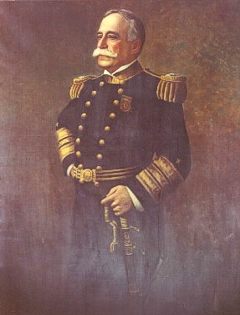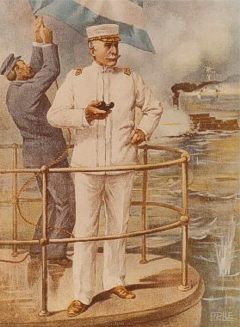

Admiral of the Navy George Dewey.
From April 1861 through August 1867, he served in Mississippi, Brooklyn, Agawam, Colorado, Kearsarge and Canandaigua; then, following a tour at the Naval Academy, commanded Narragansett and hospital ship Supply. On 27 July 1871, he was ordered to the Boston Navy Yard and, after five months’ duty there and brief instruction at the Naval Torpedo Station, Newport, Rhode Island, he again commanded Narragansett from 1 March 1873, to August 1875.
For the next two years he served as Lighthouse Inspector, Second Naval District in New York as a member of the Lighthouse Board for eight months thereafter, serving as secretary from May 1878.
On 18 October 1882, he took command of Juniata, and remained at sea from 25 October that year until July 1884, when he was ordered detached and to the Navy Department, Washington DC. Again at sea, he commanded Dolphin from October 1884 until March 1885, when he transferred to command of Pensacola.
From 1889–1893 he was commissioned Chief of the Navy’s Bureau of Equipment, when he again became a member of the Lighthouse Board and, in November 1895, President of the Board of Inspection and Survey.

Commodore George Dewey at the Battle of Manila Bay.
On 3 January 1898 he assumed command of the Asiatic Station with his flag in protected cruiser Olympia, Captain Charles V. Gridley, commanding. The Spanish-American War action at Manila, Philippine Islands, 1 May 1898, which gave birth to his historical command “you may fire when you are ready Gridley,” eliminated the Spanish fleet and installations at Manila Bay without loss of men to the US fleet.
On 10 May, Commodore Dewey was given a vote of thanks by the Congress of the United States and three days later was commissioned Rear Admiral for “highly distinguished conduct in conflict with the enemy as displayed by him in the destruction of the Spanish Fleet and batteries in the harbor of Manila, Philippine Islands, May 1, 1898.” Relieved of command of the Asiatic Station in October 1899, he became President of the General Board on 29 March 1900.
An Act of Congress, 2 March 1899, created the rank of Admiral of the Navy. On 24 March 1903, he was commissioned in that rank retroactive to the date of the act.
Admiral Dewey died at Washington, DC, 16 January 1917 and was interred in Arlington National Cemetery but, at his widow’s request, was reinterred in the crypt of Bethlehem Chapel at the Protestant Episcopal Cathedral, Mount St. Alban, Washington, on 28 March 1925.